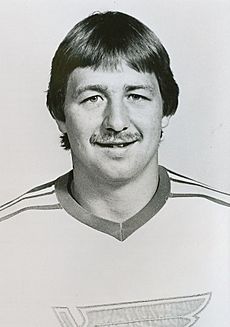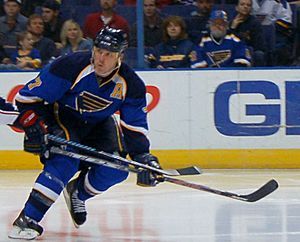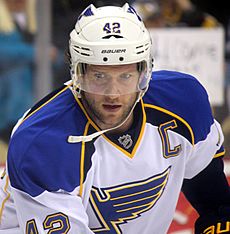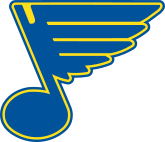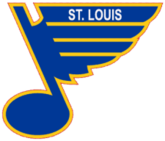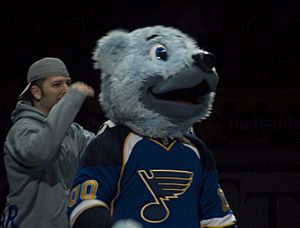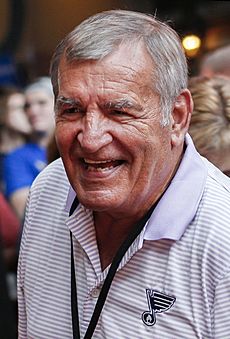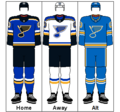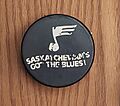St. Louis Blues facts for kids
Quick facts for kids St. Louis Blues |
|
|---|---|
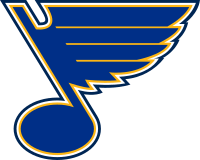 |
|
| Conference | Western |
| Division | Central |
| Founded | 1967 |
| History | St. Louis Blues 1967–present |
| Home arena | Enterprise Center |
| City | St. Louis, Missouri |
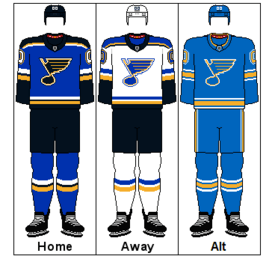 |
|
| Colors | Blue, yellow, white |
| Media | FanDuel Sports Network Midwest 101 ESPN |
| Owner(s) | SLB Acquisition Holdings LLC (Tom Stillman, chairman and governor) |
| General manager | Doug Armstrong |
| Head coach | Jim Montgomery |
| Captain | Brayden Schenn |
| Minor league affiliates | Springfield Thunderbirds (AHL) Florida Everblades (ECHL) |
| Stanley Cups | 1 (2018–19) |
| Conference championships | 1 (2018–19) |
| Presidents' Trophies | 1 (1999–00) |
| Division championships | 10 (1968–69, 1969–70, 1976–77, 1980–81, 1984–85, 1986–87, 1999–00, 2011–12, 2014–15, 2019–20) |
The St. Louis Blues are a professional ice hockey team from St. Louis, Missouri. They play in the National Hockey League (NHL) as part of the Central Division in the Western Conference. The team started in 1967 as one of six new teams in the NHL. They are named after the famous song "Saint Louis Blues" by W. C. Handy. The Blues play their home games at the Enterprise Center in downtown St. Louis, which has been their arena since 1994.
The Blues won the Stanley Cup in 2019. They have made it to the playoffs more often than any team outside of the "Original Six" (the first six NHL teams). Even though they often reached the playoffs, they struggled to win the Stanley Cup for many years. They lost in the Stanley Cup Finals in their first three seasons. After 49 years, the Blues finally won their first Stanley Cup in 2019. This made them the last of the 1967 expansion teams to win the championship.
The Blues have a big rivalry with the Chicago Blackhawks. They have been in the same division since 1970. Their minor league teams are the Springfield Thunderbirds (AHL) and the Florida Everblades (ECHL).
Contents
Team History
Early Hockey in St. Louis
Before the Blues, St. Louis had other hockey teams. The St. Louis Arena was used for hockey even though it wasn't built for it. In 1929, a minor league team called the St. Louis Flyers played there. Later, an NHL team, the Ottawa Senators, moved to St. Louis in 1934 and became the St. Louis Eagles. However, the Eagles struggled financially and only played for one season. They had to travel far for games, which was very expensive.
After the Eagles left, the NHL had only six teams for many years. The owners of the Chicago Black Hawks eventually took control of the St. Louis Arena. They sometimes played NHL games in St. Louis during the 1950s.
Joining the NHL in 1967
In 1967, the NHL decided to add six new teams. The St. Louis Blues were one of them, along with the Minnesota North Stars, Los Angeles Kings, Philadelphia Flyers, Pittsburgh Penguins, and California Seals. St. Louis was chosen partly because the Black Hawks' owners wanted to sell the old St. Louis Arena. They pushed for St. Louis to get a team, even though the city hadn't officially asked for one.
The first owners of the Blues were Sid Salomon Jr., his son Sid Salomon III, and Robert L. Wolfson. They bought the team in 1966. Sid Salomon Jr. spent millions of dollars to fix up the arena, making it bigger for more fans.
Early Success and Stanley Cup Finals (1967–1970)
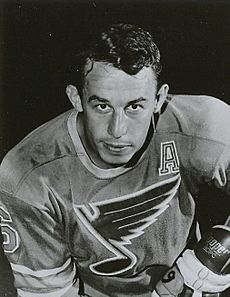
In their first season, Lynn Patrick was the general manager and coach. He later stepped down, and Scotty Bowman took over as coach. The Blues' team was made up of players from other teams and minor league players. The NHL put all the new teams in the same division to give them a fair chance at the playoffs.
Under Bowman, the Blues made it to the playoffs in their very first year. They won two exciting seven-game series to reach the 1968 Stanley Cup Finals. However, they lost to the strong Montreal Canadiens. The Blues continued to be very good in their division for the next two seasons, winning division titles. But they lost in the Stanley Cup Finals again in 1969 (to Montreal) and 1970 (to the Boston Bruins).
These early Blues teams had experienced players like Glenn Hall and Jacques Plante as goalies, who even won an award together in 1969. Players like Jim Roberts, Al Arbour, and brothers Bob and Barclay Plager were strong defenders. Red Berenson became the team's first big star. The arena became known for its loud and excited fans. The team's owner, Sid Salomon Jr., was known for treating his players very well, which made them want to play their best.
Financial Challenges and Playoff Streak (1970–1987)
The Blues' early success didn't last into the 1970s. The playoff rules changed, and the Chicago Black Hawks moved into their division, making it tougher. Coach Scotty Bowman left in 1970, and many key players retired or were traded. The team still made the playoffs but didn't go as far.
The team also faced serious money problems. The owners had made deals that cost a lot of money later on. In 1977, a pet food company called Ralston Purina bought the team and the arena to keep the Blues in St. Louis. They renamed the arena the "Checkerdome." After a couple of tough years, the Blues started a long streak of making the playoffs in 1980. This streak lasted for 25 years!
In 1981, the Blues had one of their best seasons ever, winning 45 games. Many players scored a lot of goals, including future Hall of Famer Bernie Federko and captain Brian Sutter. Their coach, Red Berenson, won an award for best coach. However, they lost in the second round of the playoffs.
Ralston Purina lost money owning the team and wanted to sell it. In 1983, a group led by Bill Hunter tried to buy the team and move it to Saskatoon, Canada. Fans were shocked, but the NHL owners voted against the move. They didn't think Saskatoon was big enough for an NHL team. Ralston Purina then said they would shut down the team if it wasn't sold. The NHL took control of the team and looked for a new owner. Just before the team was about to be dissolved, a group of St. Louis investors led by Harry Ornest bought the team and the arena in July 1983. This was the closest an NHL team had come to folding in many years.
Ornest ran the team very carefully with money. Players sometimes had to wait for their salaries, but they always got paid. The team stayed competitive, even with fewer players than other teams. During this time, Doug Gilmour became a star player. However, the Blues often lost their young stars to other teams. In 1986, the Blues made it to the conference finals but lost in a close Game 7. After that season, Ornest sold the team to a group led by Michael Shanahan.
The Brett Hull Era (1988–1998)
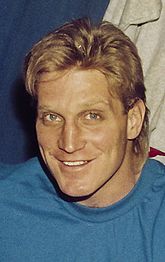
The Blues continued to be a strong team in the late 1980s and early 1990s. The general manager, Ron Caron, made smart trades, bringing in star players like Brett Hull, Adam Oates, Brendan Shanahan, Al MacInnis, and goalie Curtis Joseph. The team was good, but they couldn't get past the second round of the playoffs. Still, their success helped a group of companies buy the team and build a new arena, the Kiel Center (now Enterprise Center), which opened in 1994.
Brett Hull, known as "the Golden Brett," became one of the NHL's top scorers. In the 1990–91 season, he scored 86 goals, winning the award for the league's most valuable player. Despite having one of the best records in the league that year, the Blues lost in the second round of the playoffs.
In 1994, Mike Keenan became the general manager and coach. He made big changes, trading away popular players like Brendan Shanahan and Curtis Joseph. He also brought in famous players like Wayne Gretzky and goalie Grant Fuhr, but they were older. Keenan was fired in 1996. Brett Hull, who had problems with Keenan, left the team in 1998. He went on to win the Stanley Cup with the Dallas Stars the next year. The Blues made the playoffs every year in the 1990s, but they still hadn't won the Stanley Cup.
End of Playoff Streak and Rebuilding (1998–2011)
Players like Chris Pronger, Keith Tkachuk, Pavol Demitra, Pierre Turgeon, Al MacInnis, and goalie Roman Turek kept the Blues competitive. In the 1999–2000 season, the team had a record-breaking 114 points, winning the Presidents' Trophy for the best record in the league. However, they were surprisingly defeated in the first round of the playoffs. In 2001, the Blues reached the conference finals but lost to the Colorado Avalanche. The team continued to make the playoffs until 2004, completing a 25-year playoff streak, one of the longest in sports history. But they never reached the Stanley Cup Finals during this time.
After the 2004–05 NHL lockout, the Blues had their worst record in 27 years in the 2005–06 season and missed the playoffs. Fan attendance also dropped. The team's owners, Nancy Walton Laurie and her husband Bill, decided to sell the team. In 2006, SCP Worldwide and TowerBrook Capital Partners bought the Blues.
The new management focused on rebuilding the team. They brought in John Davidson to lead the hockey operations. The team signed new players and traded others for draft picks to get young talent. They drafted promising players like T. J. Oshie, Erik Johnson, and David Perron. In 2006, the Blues fired coach Mike Kitchen and hired Andy Murray. Despite improvements, they missed the playoffs for a second year in a row.
In 2007, the Blues signed Paul Kariya and re-signed Keith Tkachuk. They also introduced a new mascot, Louie. In 2008, Eric Brewer became the team's captain. After a tough start to the 2008–09 season, the Blues improved greatly in the second half and made the playoffs. However, they lost in the first round.
In 2010, the Blues fired coach Andy Murray and hired Davis Payne. The team continued to rebuild, signing new players like Brian Elliott and Jason Arnott in 2011. They fired Payne in November 2011 and hired Ken Hitchcock as coach. David Backes was named the new team captain.
Stanley Cup Champions (2011–Present)
In the 2011–12 season, under coach Ken Hitchcock, the Blues had a great year, reaching 100 points and making the playoffs. They finished second in the Western Conference. They won their first playoff series since 2002, beating the San Jose Sharks. However, they were swept by the Los Angeles Kings in the next round.
In the 2012–13 season, the Blues again made the playoffs but lost to the Kings in the first round. The next season, 2013–14, they had a franchise-record 52 wins. But they lost their last six games and were eliminated in the first round of the playoffs by the Chicago Blackhawks. This was the second year in a row they lost in the first round after leading the series.
In 2014–15, the Blues won their division but lost in the first round of the playoffs again. Key player T. J. Oshie was traded. In 2015–16, the Blues finished second in their division. They finally broke their first-round losing streak by beating the Chicago Blackhawks in a thrilling Game 7. They then defeated the Dallas Stars to reach the conference finals for the first time since 2001, but lost to the San Jose Sharks.
In 2016, Mike Yeo was announced as the next head coach. The team saw many changes, with captain David Backes and goalie Brian Elliott leaving. Alex Pietrangelo was named the new team captain. In 2017, the Blues beat the Blackhawks in the Winter Classic outdoor game. Coach Hitchcock was fired in February 2017, and Yeo took over. The Blues made the playoffs but lost in the second round.
The 2017–18 season was tough with many injuries to key players. The Blues missed the playoffs for the first time in seven years. In the 2018 off-season, the Blues acquired Ryan O'Reilly and brought back David Perron. They also signed Tyler Bozak and St. Louis native Patrick Maroon. In November 2018, coach Mike Yeo was fired, and Craig Berube became the interim coach. The team was in last place in the league in January 2019.
However, the Blues had an amazing comeback! They went on an eleven-game winning streak and made the playoffs. A rookie goalie, Jordan Binnington, played a huge role in their success.
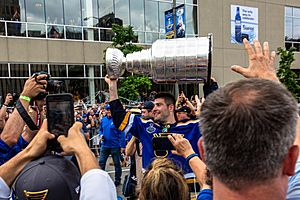
On May 21, 2019, the Blues reached the Stanley Cup Final for the first time since 1970, beating the San Jose Sharks. On May 29, they won their first-ever Stanley Cup Finals game. On June 12, 2019, the Blues defeated the Boston Bruins 4–1 in Game 7 to win their first Stanley Cup! Ryan O'Reilly was named the playoff MVP. The Blues were the oldest team in the NHL to finally win the Stanley Cup. After this victory, Craig Berube became the permanent head coach. The Missouri Senate even passed a bill to make the Blues the state's official hockey team.
In the 2019–20 season, the Blues faced more injuries, including to star player Vladimir Tarasenko. However, they continued to play well and were at the top of the Western Conference when the season was paused due to the COVID-19 pandemic. The NHL organized a special tournament for the playoffs, but the Blues struggled and lost in the first round. In September 2020, goalie Jake Allen was traded.
Team Information
Arena
The Blues play their home games at the Enterprise Center, which holds 19,150 fans. They have played there since 1994. Before that, from 1967 to 1994, they played at the St. Louis Arena, which was also known as The Checkerdome for a time.
Fan Attendance
The St. Louis Blues usually have great fan support. After the 2004–05 NHL lockout, attendance dropped but has improved steadily. In the 2009–10 season, the Blues had almost full attendance at their home games, ranking seventh in the NHL. In 2010–11, they sold out every home game.
Jerseys
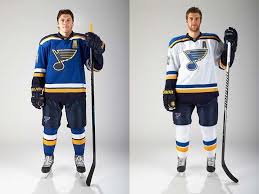
The Blues have always worn blue and white jerseys with their famous "Blue Note" logo and gold accents since 1967. Over the years, their jerseys have changed slightly.
- From 1967 to 1984, they used a lighter blue.
- In 1984, they added red and a darker blue.
- In 1994, they introduced a more modern design with more red.
- In 1997, they brought back a lighter blue and used navy blue instead of red as an accent.
- In 2007, their jerseys were simplified.
- In 2008, they added a new navy blue third jersey with a logo featuring the Gateway Arch.
- In 2014, they went back to a look similar to their 1998–2007 jerseys.
- In 2018, they added a third jersey based on their 2017 Winter Classic uniform.
- For the 2020–21 season, they had a "Reverse Retro" jersey with a red base.
- In 2022–23, another "Reverse Retro" jersey was gold-based, inspired by early team designs.
- For the 2025 Winter Classic, they wore vintage white uniforms with light blue and gold stripes.
- Starting with the 2025–26 season, the Blues will have new main uniforms that go back to their original blue and yellow colors. They also introduced new alternate logos, including a musical note, an interlocking "STL" design, and a trumpet with the Gateway Arch.
Mascot
The St. Louis Blues' mascot is Louie. He was introduced in October 2007. Fans voted on his name. Louie is a blue polar bear who wears a Blues jersey with "Louie" and the number "00" on the back.
Radio and Television
For many years, the Blues games were broadcast on KMOX radio, a powerful station that could be heard across North America at night. This made announcer Dan Kelly very famous. Players liked that their families could listen to the games.
Over time, the broadcasts moved to different stations. In 1985, the radio rights changed, and Dan Kelly moved to KXOK. However, that station wasn't as strong, and the Blues eventually returned to KMOX. Dan Kelly passed away in 1989. His son, John Kelly, later became a play-by-play announcer for the team.
Since the 2019–20 season, WXOS (101 ESPN) has been the main radio station for the Blues. Chris Kerber and Joe Vitale are the current radio announcers. John Kelly and Jamie Rivers are the current TV announcers. Starting with the 2025–26 season, the Blues will have the same announcers for both radio and TV.
Team Traditions
The Blues have many fun traditions:
- Organ Music: Before games, the Blues organist, Jeremy Boyer, plays the song "St. Louis Blues". He also plays a short version at the end of each period, followed by "When the Saints Go Marching In." After Blues goals, he plays "When the Saints Go Marching In," and fans sing "When the Blues Go Marching In."
- National Anthem: At the end of the national anthem, fans loudly sing "the home of the Blues" instead of "the home of the brave."
- Goal Song: Since 2018, the team's goal song has been "The Blues Have The Urge" by the St. Louis band The Urge. During the 2019 playoffs, Laura Branigan's "Gloria" was also played after wins.
- Goal Horn and Bell: The Blues started using a goal horn in 1992. After each goal, a bell is rung, and fans count the goals. Since 1990, a fan known as the "Towel Man" throws a towel into the crowd after each goal.
- "Country Roads": Since February 2019, the song "Country Roads" by John Denver is played during the third period of every home game. Fans sing along loudly, even if the music stops. This tradition started by accident but became very popular.
- Fan Salute: After every home win, the entire Blues team skates to center ice, raises their sticks, and claps to thank the fans.
Season Records
Here are the Blues' results for the last five seasons:
| Season | Games Played | Wins | Losses | Overtime Losses | Points | Goals For | Goals Against | Finish | Playoffs |
| 2020–21 | 56 | 27 | 20 | 9 | 63 | 169 | 170 | 4th, West | Lost in first round, 0–4 (Avalanche) |
| 2021–22 | 82 | 49 | 22 | 11 | 109 | 311 | 242 | 3rd, Central | Lost in second round, 2–4 (Avalanche) |
| 2022–23 | 82 | 37 | 38 | 7 | 81 | 263 | 301 | 6th, Central | Did not qualify |
| 2023–24 | 82 | 43 | 33 | 6 | 92 | 239 | 250 | 5th, Central | Did not qualify |
| 2024–25 | 82 | 44 | 30 | 8 | 96 | 254 | 233 | 5th, Central | Lost in first round, 3–4 (Jets) |
Players and Team Staff
Team Captains
The Blues have had many captains throughout their history:
- Al Arbour, 1967–1970, 1971
- Red Berenson, 1970–1971, 1976, 1977–1978
- Jim Roberts, 1971–1972
- Barclay Plager, 1972–1976
- Garry Unger, 1976–1977
- Barry Gibbs, 1978–1979
- Brian Sutter, 1979–1988
- Bernie Federko, 1988–1989
- Rick Meagher, 1989–1990
- Scott Stevens, 1990–1991
- Garth Butcher, 1991–1992
- Brett Hull, 1992–1995
- Shayne Corson, 1995–1996
- Wayne Gretzky, 1996
- Chris Pronger, 1997–2003
- Al MacInnis, 2003–2004
- Dallas Drake, 2005–2007
- Eric Brewer, 2008–2011
- David Backes, 2011–2016
- Alex Pietrangelo, 2016–2020
- Ryan O'Reilly, 2020–2023
- Brayden Schenn, 2023–present
Hockey Hall of Fame Members
Many players and important people from the St. Louis Blues have been inducted into the Hockey Hall of Fame. This includes 26 former players and seven "builders" (like coaches or owners) who helped the sport grow. Two Blues broadcasters have also received awards from the Hall of Fame: Dan Kelly in 1989 and John Davidson in 2009.
Players
- Glenn Anderson
- Tom Barrasso
- Martin Brodeur
- Guy Carbonneau
- Bernie Federko
- Grant Fuhr
- Doug Gilmour
- Wayne Gretzky
- Glenn Hall
- Doug Harvey
- Dale Hawerchuk
- Phil Housley
- Brett Hull
- Paul Kariya
- Guy Lapointe
- Al MacInnis
- Dickie Moore
- Joe Mullen
- Vaclav Nedomansky
- Adam Oates
- Jacques Plante
- Chris Pronger
- Brendan Shanahan
- Peter Stastny
- Scott Stevens
- Pierre Turgeon
Builders
- Scotty Bowman
- Jim Devellano
- Cliff Fletcher
- Emile Francis
- Ken Hitchcock
- Roger Neilson
- Lynn Patrick
St. Louis Blues Hall of Fame
The Blues started their own team Hall of Fame in 2023.
2023 Inductees
- Red Berenson
- Scotty Bowman
- Bernie Federko
- Bob Gassoff
- Glenn Hall
- Brett Hull
- Dan Kelly
- Al MacInnis
- Barclay Plager
- Bob Plager
- Chris Pronger
- Sid Salomon Jr.
- Sid Salomon III
- Brian Sutter
- Garry Unger
2024 Inductees
- Pavol Demitra
- Mike Liut
- Keith Tkachuk
2025 Inductees
- Wayne Babych
- Curtis Joseph
- Jim Roberts
Retired Numbers
The Blues have retired several jersey numbers to honor important players:
| No. | Player | Position | Years Played | Date Retired |
|---|---|---|---|---|
| 2 | Al MacInnis | D | 1994–2004 | April 9, 2006 |
| 3 | Bob Gassoff | D | 1974–1977 | October 1, 1977 |
| 5 | Bob Plager | D | 1967–1978 | February 2, 2017 |
| 8 | Barclay Plager | D | 1967–1977 | March 24, 1981 |
| 11 | Brian Sutter | LW | 1976–1988 | December 30, 1988 |
| 16 | Brett Hull | RW | 1987–1998 | December 5, 2006 |
| 24 | Bernie Federko | C | 1976–1989 | March 16, 1991 |
| 44 | Chris Pronger | D | 1995–2004 | January 17, 2022 |
The NHL also retired Wayne Gretzky's number 99 for all teams in 2000. Gretzky played for the Blues in 1996.
Honored Numbers
Some numbers are honored but not fully retired, meaning no one else wears them:
- 7 – Honored for Garry Unger, Red Berenson, Joe Mullen, and Keith Tkachuk.
- 14 – Honored for Doug Wickenheiser, who played from 1984–1987. No one wears this number anymore.
- Dan Kelly, the team's broadcaster, is honored with a shamrock banner.
Awards and Trophies
The St. Louis Blues and their players have won many awards:
- 2019
Presidents' Trophy (Best regular season record)
- 2000
Clarence S. Campbell Bowl (Western Conference champion)
- 1969, 1970, 2019
Bill Masterton Memorial Trophy (Perseverance, sportsmanship, dedication)
- Blake Dunlop: 1981
- Jamie McLennan: 1998
Calder Memorial Trophy (Best rookie)
- Barret Jackman: 2003
Conn Smythe Trophy (Playoff MVP)
- Glenn Hall: 1968
- Ryan O'Reilly: 2019
Frank J. Selke Trophy (Best defensive forward)
- Rick Meagher: 1990
- Ryan O'Reilly: 2019
Hart Memorial Trophy (League MVP)
- Brett Hull: 1991
- Chris Pronger: 2000
Jack Adams Award (Best coach)
- Red Berenson: 1981
- Brian Sutter: 1991
- Joel Quenneville: 2000
- Ken Hitchcock: 2012
James Norris Memorial Trophy (Best defenseman)
- Al MacInnis: 1999
- Chris Pronger: 2000
King Clancy Memorial Trophy (Leadership and humanitarian contribution)
- Kelly Chase: 1998
Lady Byng Memorial Trophy (Sportsmanship and gentlemanly conduct)
- Phil Goyette: 1970
- Brett Hull: 1990
- Pavol Demitra: 2000
Lester B. Pearson Award (Most outstanding player, voted by players)
- Mike Liut: 1981
- Brett Hull: 1991
Lester Patrick Trophy (Contributions to hockey in the U.S.)
- Larry Pleau: 2002
NHL General Manager of the Year Award
- Doug Armstrong: 2012
NHL Plus/Minus Award (Best plus/minus rating)
- Paul Cavallini: 1990
- Chris Pronger: 1998, 2000
Vezina Trophy (Best goalie)
- Glenn Hall and Jacques Plante: 1969
William M. Jennings Trophy (Goalies on team with fewest goals allowed)
- Roman Turek: 2000
- Brian Elliott and Jaroslav Halak: 2012
Team Records
Top Scorers (Regular Season)
These are the players with the most points in the Blues' regular season history:
- * – current Blues player
|
|
|
Top Scorers (Playoffs)
These are the players with the most points in the Blues' playoff history:
- * – current Blues player
|
|
|
Individual Player Records
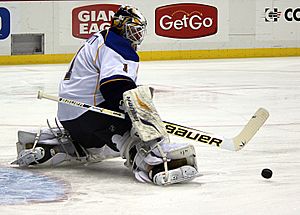
Here are some individual records for the Blues in a single season:
- Most goals: Brett Hull, 86 (1990–91)
- Most assists: Adam Oates, 90 (1990–91)
- Most points: Brett Hull, 131 (1990–91)
- Most penalty minutes: Bob Gassoff, 306 (1975–76)
- Most points by a defenseman: Jeff Brown, 78 (1992–93)
- Most points by a rookie: Jorgen Pettersson, 73 (1980–81)
- Most wins by a goalie: Roman Turek, 42 (1999–2000)
- Most shutouts by a goalie: Brian Elliott, 9 (2011–12)
- Lowest goals-against average (GAA) by a goalie (minimum 30 games): Brian Elliott, 1.56 (2011–12)
- Best save percentage (SV%) by a goalie (minimum 30 games): Brian Elliott, .940 (2011–12)
Images for kids
See also
 In Spanish: St. Louis Blues para niños
In Spanish: St. Louis Blues para niños


